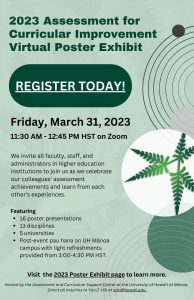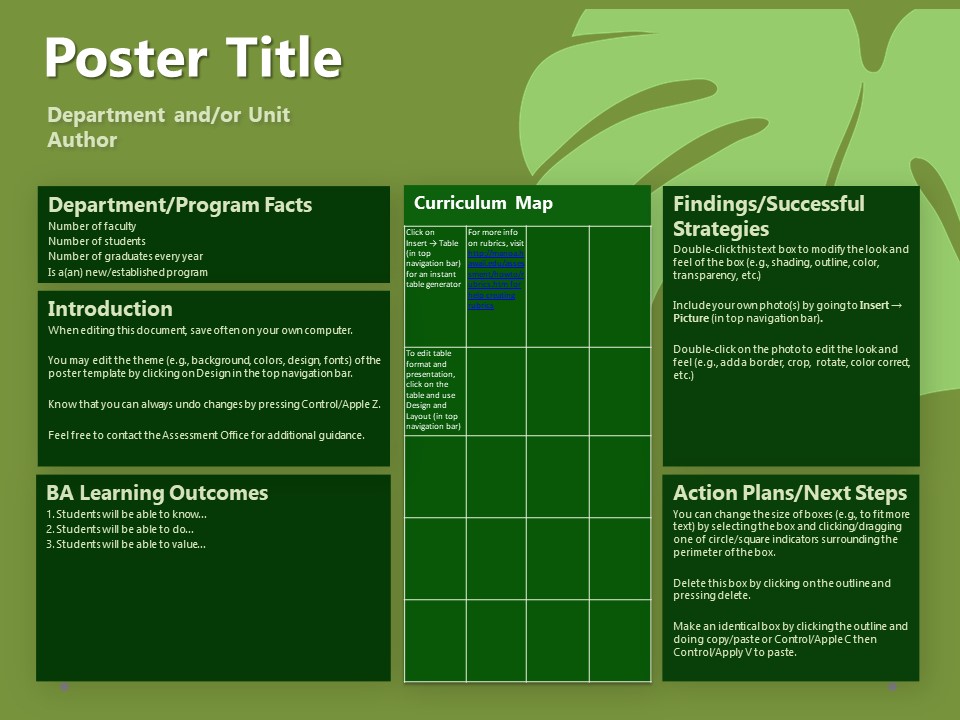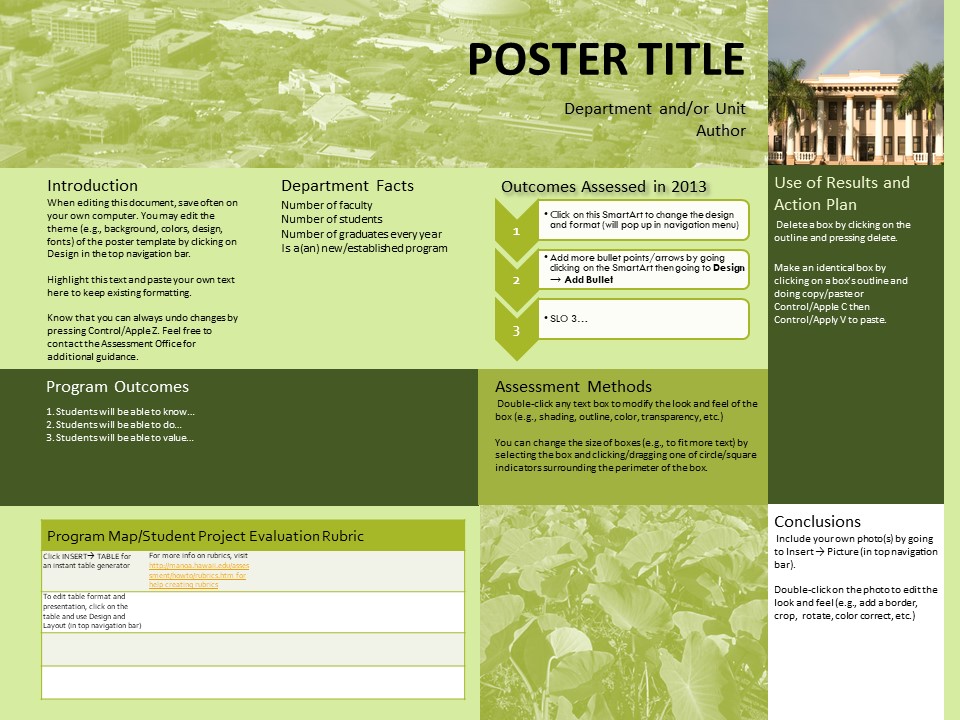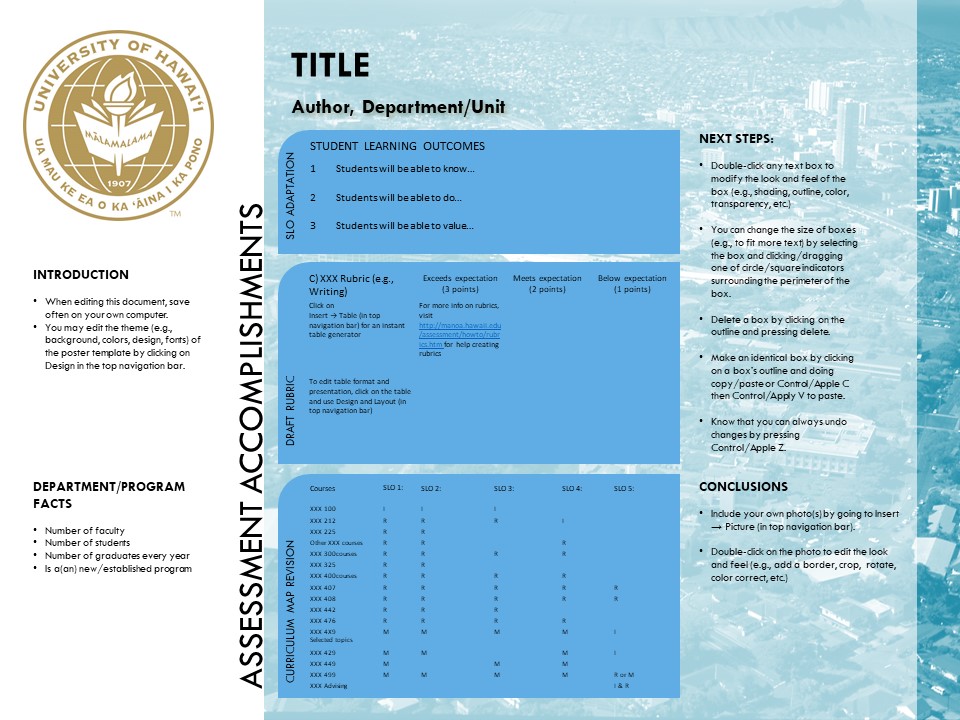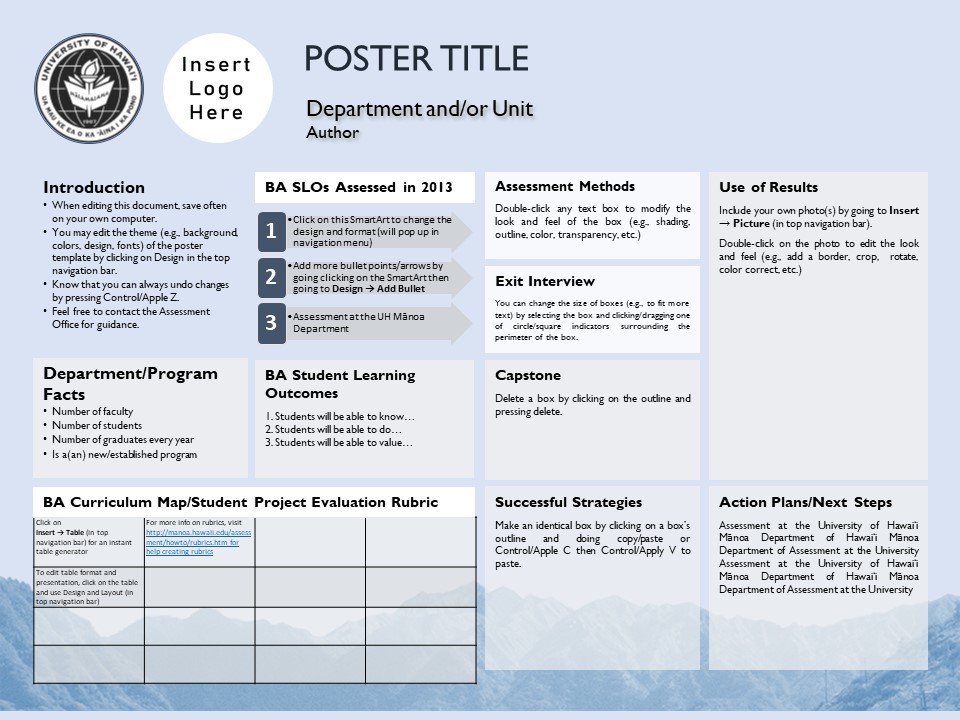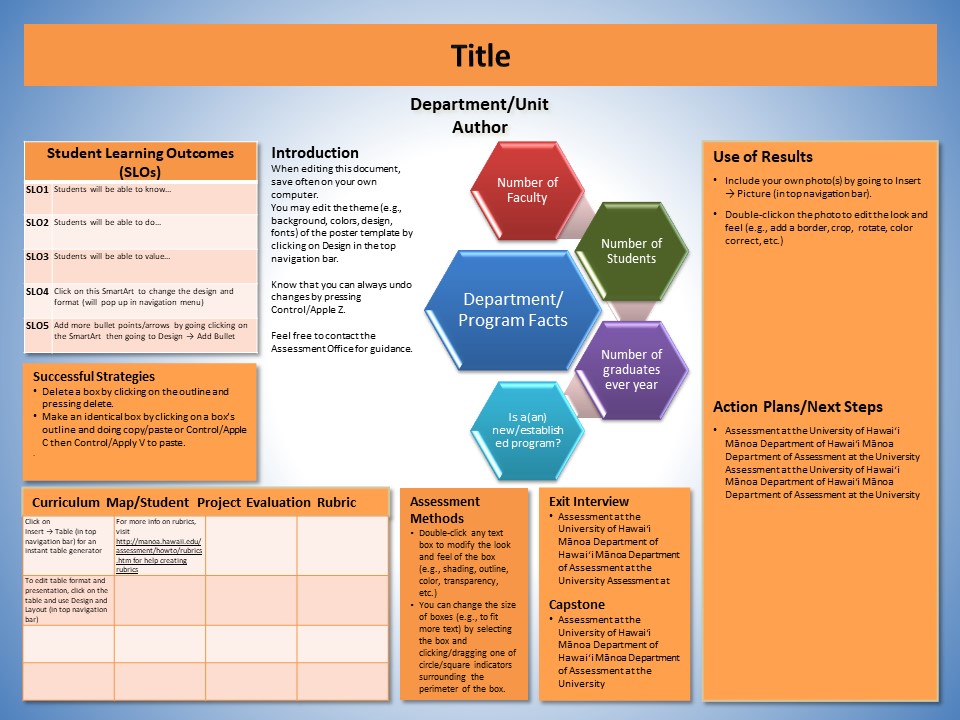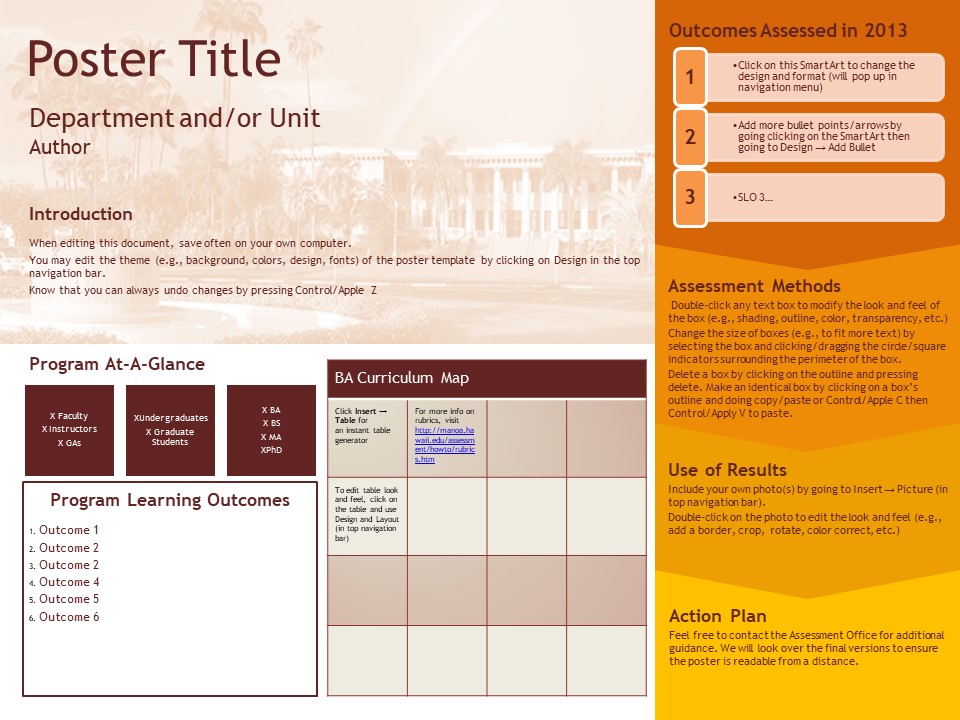March 27-31, 2023, online
On Monday, March 27th, 2023, the Assessment and Curriculum Support Center hosted 90 attendees and 16 assessment posters from five institutions at the 9th Assessment for Curricular Improvement Poster Exhibit. Attendees circulated through Zoom breakout rooms to visit with poster presenters and discuss program assessment for the purpose of improving student learning. The live Zoom session on Friday was the culminating event of this year’s exhibit. The session ended with a great in-person pau hana event on the UH campus on March 31st.
The Assessment and Curriculum Support Center would like to thank everyone involved for being part of this year’s virtual event. We congratulate the following poster award winners:
Poster Awards
Best Poster Design (2-way tie):
- Kimberly U’ilani Chow-Rule (Nursing, University of Hawaiʻi at Mānoa): Ho’okaulike: Integrating Hawaiian Culture as an example of cultural safety in a nursing curriculum
- Thomas Quattlebaum & Cynthia Kim (Family Medicine and Community Health, University of Hawaiʻi at Mānoa): Look and Listen: Developing Faculty Competency in Direct Observation
Best Use of Assessment for Improvement (2-way tie):
- Aimee Chung & Wendy Lum (Social Work, University of Hawaiʻi at Mānoa): Assessment and the Competent Field Education Student: A Rubric for Learning Decolonized Social Work Practice
- Jennifer Griswold (Atmospheric Sciences, University of Hawaiʻi at Mānoa): Connecting Courses to Competency: Mapping the ATMO Curriculum
Best Faculty Engagement Strategies (2-way tie):
- Thomas Quattlebaum & Cynthia Kim (Family Medicine and Community Health, University of Hawaiʻi at Mānoa): Look and Listen: Developing Faculty Competency in Direct Observation
- Priscilla Sung (Institutional Research, Assessment, & Policy Studies, University of California, Santa Cruz): From Seedlings to Harvest: Successes and Challenges of a Grassroots Approach to Assessment
Posters at the 2023 Exhibit
Aquino, Kamakanaokealoha and Kapahua, Kawenaʻulaokalā (University of Hawaiʻi at Mānoa) – Indigenous Social Sciences Curriculum: An Assessment of Undergraduate Programs in the College of Social Sciences
Black, Rhonda and Sara Cook (Special Education, University of Hawaiʻi at Mānoa): Forming shared vision through program assessment in the Special Education MEd Program
Brooks, Lauren and Hutchinson-Anderson, Kelly (Chemistry, Nazareth College): Core assessment: general education and faculty engagement
Carlisle, Kristy and Shirley, David (Old Dominion University): Making Institutional Academic Assessment Work for Faculty
U’ilani Chow-Rule, Kimberly (Nursing, University of Hawaiʻi at Mānoa): Ho’okaulike: Integrating Hawaiian Culture as an example of cultural safety in a nursing curriculum
Chung, Aimee and Lum, Wendy (Social Work, University of Hawaiʻi at Mānoa): Assessment and the Competent Field Education Student: A Rubric for Learning Decolonized Social Work Practice
Doyle, Laura Brewster, Andrea, Bachens, Chris and Mains, Bill (Santa Clara University): Graduate Assessment at a Predominantly Undergraduate Institution
Eng, Matt and Makino-Kanehiro, Megumi (Mānoa Advising Center, University of Hawaiʻi at Mānoa): Mapping Program Learning Outcomes for UNIV Exploratory Courses
Griswold, Jennifer (Atmospheric Sciences, University of Hawaiʻi at Mānoa): Connecting Courses to Competency: Mapping the ATMO Curriculum
Lin, Shu Hwa (Fashion Design & Merchandising, University of Hawaiʻi at Mānoa): Fashion from Aloha Shirts
Odani, Jenee (Human Nutrition, Food and Animal Sciences, University of Hawaiʻi at Mānoa): Learning to Teach and Assess Problem Solving in Animal Sciences
Quattlebaum, Thomas & Kim, Cynthia (Family Medicine and Community Health, University of Hawaiʻi at Mānoa): Look and Listen: Developing Faculty Competency in Direct Observation
Saito-Tom, Lynne (Obstetrics, Gynecology and Women’s Health, University of Hawaiʻi at Mānoa): Enhancing Direct Observation of Medical Students during the Obstetrics and Gynecology Clerkship
Sickel, Aaron and Tiffany-Kinder, Ronnie (Elementary Education, University of Hawaiʻi at Mānoa): Supporting Formative Feedback on Teacher Candidates’ Lesson Observations: The Design of a Developmental Curriculum
Sung, Priscilla (Institutional Research, Assessment, & Policy Studies, University of California, Santa Cruz): From Seedlings to Harvest: Successes and Challenges of a Grassroots Approach to Assessment
Wu, Jing (East Asian Languages & Literatures, University of Hawaiʻi at Mānoa): Implementation of Integrated Performance Assessment (IPA) at Postsecondary Mandarin Chinese Classes
View past posters in our archive here.
Join us in 2023 to share successful assessment strategies, gather ideas for curricular and co-curricular assessment, and network with colleagues.
Who attends the Poster Exhibit? Faculty, staff, and administrators interested in learning assessment for improvement.
Cost? No fee. Free to presenters and attendees.
Poster Exhibit Timeline
| Date (2023) | Description |
|---|---|
| March 27 | Posters and videos available to view online |
| March 31 | Live poster exhibit (via Zoom) |
| 10:30-11:30 AM HST | Presenter-only poster session to view peers’ work |
| 11:30 AM -12:45 PM HST | Poster Exhibit event – online, live discussion with presenters via Zoom |
| 3:00-4:30 PM HST | Post-event pau hana celebration with presenters (art building) |
Presenter Instructions and Help
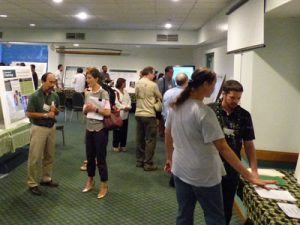
[expand title=”Instructions to 2023 Poster Presenters” startwrap=%(%h4%)% endwrap=%(%/h4%)% trigclass=”noarrow”]
- Complete the poster presentation signup form that is due approximately two months before the live poster session. Information needed:
- Contact information for presenter and co-presenters
- Poster title
- Poster abstract of 50-150 words
- Confirmation that you or a representative will attend the live Zoom discussion
- Consent or decline to have your poster published in UHM’s ScholarSpace repository.
- Help is available. See below for poster templates, tips, and assistance recording a video presentation. Or, feel free to contact us at airo@hawaii.edu for help with content, design, or technical issues.
- Submit a PDF version of your poster to airo@hawaii.edu two weeks before the live poster session.
- Optional: submit a 2-5 minute video recording of your presentation to airo@hawaii.edu two weeks before the live poster session.
- Engage with attendees at the live Zoom meeting (see above for day and time).
[/expand]
[expand title=”Poster Evaluation Criteria” expanded=”true” startwrap=%(%h4%)% endwrap=%(%/h4%)% trigclass=”noarrow”]1. Poster Design Quality
| 4 | Wow! Exceptionally attractive in design, layout, and neatness. The design enhances the content and represents a clear flow of the content. The font size and typeface intentionally signal main and subordinate points/messages and are very easy to read. Graphics (if used) easily and quickly convey the meaning. |
| 3 | Good. Design, layout, and neatness help the viewer understand the content. The font size and typeface are appropriately sized for easy reading. Graphics (if used) convey the meaning, with the help of the text. |
| 2 | Okay. Design, layout, font are perfunctory and do not help or hinder the message. |
| 1 | Umm… Design, layout, font hinder the message. For example, design is cluttered or illogical, layout is confusing, too much text, font size is too small to read. |
2. Use of Assessment for Improvement
| 4 | Wow! A group of faculty members (or other stakeholders) collaborated to use an assessment process or the assessment results directly and intentionally for the purpose of improvement (of student learning, the curriculum, resource allocation, policies, assessment processes themselves). They implemented the assessment process, engaged in critical reflection, and used the process and/or assessment results to logically inform changes. Bonus points to posters in which a follow-up assessment project was conducted to examine the effectiveness of the changes made. |
| 3 | Good. Assessment for improvement because the faculty (or other stakeholders) made changes that were informed by assessment processes and/or results. |
| 2 | Okay. The faculty (or other stakeholders) discussed possible actions but no clear action has been taken —OR— the faculty made changes but it’s not clear how the actions are tied to the assessment process/results. |
| 1 | Umm… The project focuses on the assessment process or results itself without reflection/discussion/use of the process/results for improvement actions. |
3. Faculty Engagement Strategies
(a good assessment process is collaborative)
| 4 | Wow! The strategies to engage faculty (or other stakeholders) are really working. Faculty/stakeholders participate in assessment-related activities. They appear involved with an assessment-for-improvement process through their regular participation and ongoing attention to curriculum effectiveness and student learning at the program or institution level. |
| 3 | Good. Engagement strategies were used because faculty (or other stakeholders) did participate in at least one assessment-related activity aimed at the program/institution level. |
| 2 | Okay. The strategies appear to have engaged a few committed folks, but it’s unclear if participation is widespread and if faculty regularly attend to learning and curriculum development at the program/institution level as a result of the strategies. |
| 1 | Umm… It seems to be a project primarily done by one person without participation/engagement from other faculty members. |
[expand title=”Poster Content Considerations” expanded=”true” startwrap=%(%h4%)% endwrap=%(%/h4%)% trigclass=”noarrow”]
| Have a clear theme and organization | A program’s assessment efforts may include many accomplishments. Focus on a central theme/problem/project and organize the content to enhance the take-away message. |
| Content is useful for audience | Whenever possible, describe the processes, strategies, and tools that others may adapt/adopt. Attendees also appreciate knowing the challenges faced in the assessment project and (possible) solutions. |
| Focus on assessment-for-improvement | A primary goal of assessment is program and student learning improvement. Describe the action(s) that the program took in response to the assessment findings or challenges encountered (e.g., redesigning assignments, changing pre-requisites, refining advising practice, increasing faculty collaboration and collegiality). If possible, include the impact on student learning after the program took the action(s). |
[/expand]
[expand title=”Strategies and Tutorials to Create Effective Posters & Presentations” expanded=”true” startwrap=%(%h4%)% endwrap=%(%/h4%)% trigclass=”noarrow”]
- For tips and tools for designing an engaging poster, please review our Best Strategies to Create Effective Posters.
- Video tutorial on how to record a poster presentation using Zoom.
- Video tutorial with tips on to create an effective bar chart to display assessment results.
- Instructional guide to creating timelines using Canva.com.
[/expand]
[expand title=”Poster Templates” expanded=”true” startwrap=%(%h4%)% endwrap=%(%/h4%)% trigclass=”noarrow”]
Please feel free to use the following letter-sized (11″ width x 8.5″ height) templates to create your virtual poster for online poster presentations (PowerPoint Slide/Google Slide).
Note: To produce posters for printing (52″ width x 38″ height), please use these 52″x38″ templates.
[/expand]
[expand title=”Suggested Poster Content” expanded=”true” startwrap=%(%h4%)% endwrap=%(%/h4%)% trigclass=”noarrow”]
- Basic program information such as the number of faculty and students, degree(s) offered, and number of graduates per year
- Context of the assessment project: program learning assessment status/history of assessment in your program
- Description of the assessment project: useful tips, strategies, tools, steps in the process, end products, etc.
- Highlight how your program used assessment processes/findings for improvement
- Summary of accomplishments, lessons, strategies/tools to share
- Acknowledgements–assessment is a team sport
[/expand]
[expand title=”Sample Topics and Past Presenters” expanded=”true” startwrap=%(%h4%)% endwrap=%(%/h4%)% trigclass=”noarrow”]
- Use of assessment results for curricular improvement
- Curriculum mapping and its role in program assessment and improvement
- Development and use of a rubric for program assessment
- Capstone portfolio assessment for curricular improvement
- For more examples, see posters from the 2021 exhibit.
Best Poster Design 2021
- Jamie Sickel & Kara Plamann Wagoner (Center for Excellence in Learning, Teaching and Technology, Kapi‘olani Community College): Integrated Planning for Student Success: Kapi‘olani Community College’s Continuous Improvement Journey
- Runners-Up:
- Dorothy Hirata, Laura Chuang, Matt Parcon, Alice Swift, and Marisa Yamada (Information Technology Services, University of Hawaiʻi): UH Online 5-Week Professional Development (PD) Program Evaluation and Iterative Improvements
- Sandra von Doetinchem (Outreach College, Continuing & Professional Programs, University of Hawaiʻi at Mānoa): Incorporating Learning Outcome Assessments into Noncredit Education: A Novel Approach
- Kacie Ho, Soojin Jun, and Yong Li (Human Nutrition, Food and Animal Sciences, University of Hawaiʻi at Mānoa): Assessing Written Communication Skills across Food Science Courses with a Common Rubric
Best Use of Assessment for Improvement (3-way tie) 2021
- Richard Rath & Ulla Hasager (Ethnic Studies, University of Hawaiʻi at Mānoa): Assessing Civic and Community Engagement in Ethnic Studies
- Howard Shen, Edward McAssey, and Michael Muszynski (School of Life Sciences, University of Hawaiʻi at Mānoa): Establishing an Assessment Plan for the Undergraduate Molecular and Cell Biology Curriculum to Achieve Program Permanence at UHM
- Jamie Sickel & Kara Plamann Wagoner (Center for Excellence in Learning, Teaching and Technology, Kapi‘olani Community College): Integrated Planning for Student Success: Kapi‘olani Community College’s Continuous Improvement Journey
- Runners-Up:
- Haidan Wang, Song Jiang, Li Jiang, and Ming-Bao Yue (East Asian Languages & Literatures, University of Hawaiʻi at Mānoa): Creating a Rubric of Critical Thinking for Writing Intensive Courses
- MB Ogawa (Information and Computer Sciences, University of Hawaiʻi at Mānoa): Curricular Assessment for Improved Sequenced Learning
Best Faculty Engagement Strategies (2-way tie) 2021
- Richard Rath & Ulla Hasager (Ethnic Studies, University of Hawaiʻi at Mānoa): Assessing Civic and Community Engagement in Ethnic Studies
- Jamie Sickel & Kara Plamann Wagoner (Center for Excellence in Learning, Teaching and Technology, Kapi‘olani Community College): Integrated Planning for Student Success: Kapi‘olani Community College’s Continuous Improvement Journey
- Runners-Up:
- Dustin Crowther, Betsy Gilliland, Kenton Harsch, Daniel Isbell, and Cari Gochenouer (Second Language Studies, University of Hawaiʻi at Mānoa): Oral Communication for Language Teachers: Assessment Rubric Development
[/expand]

